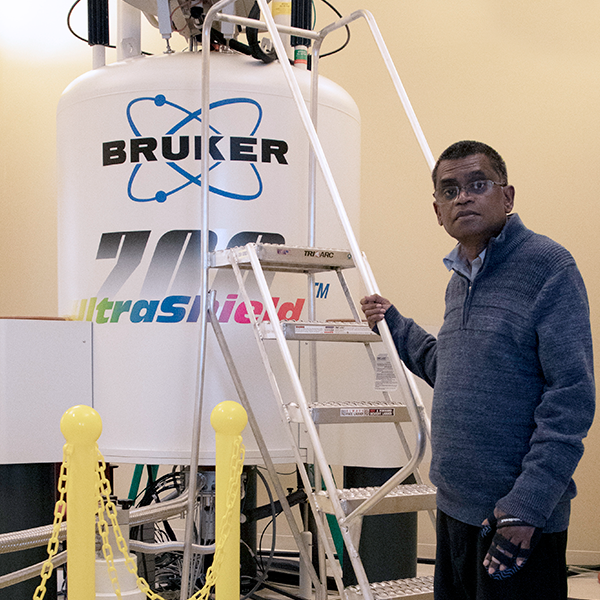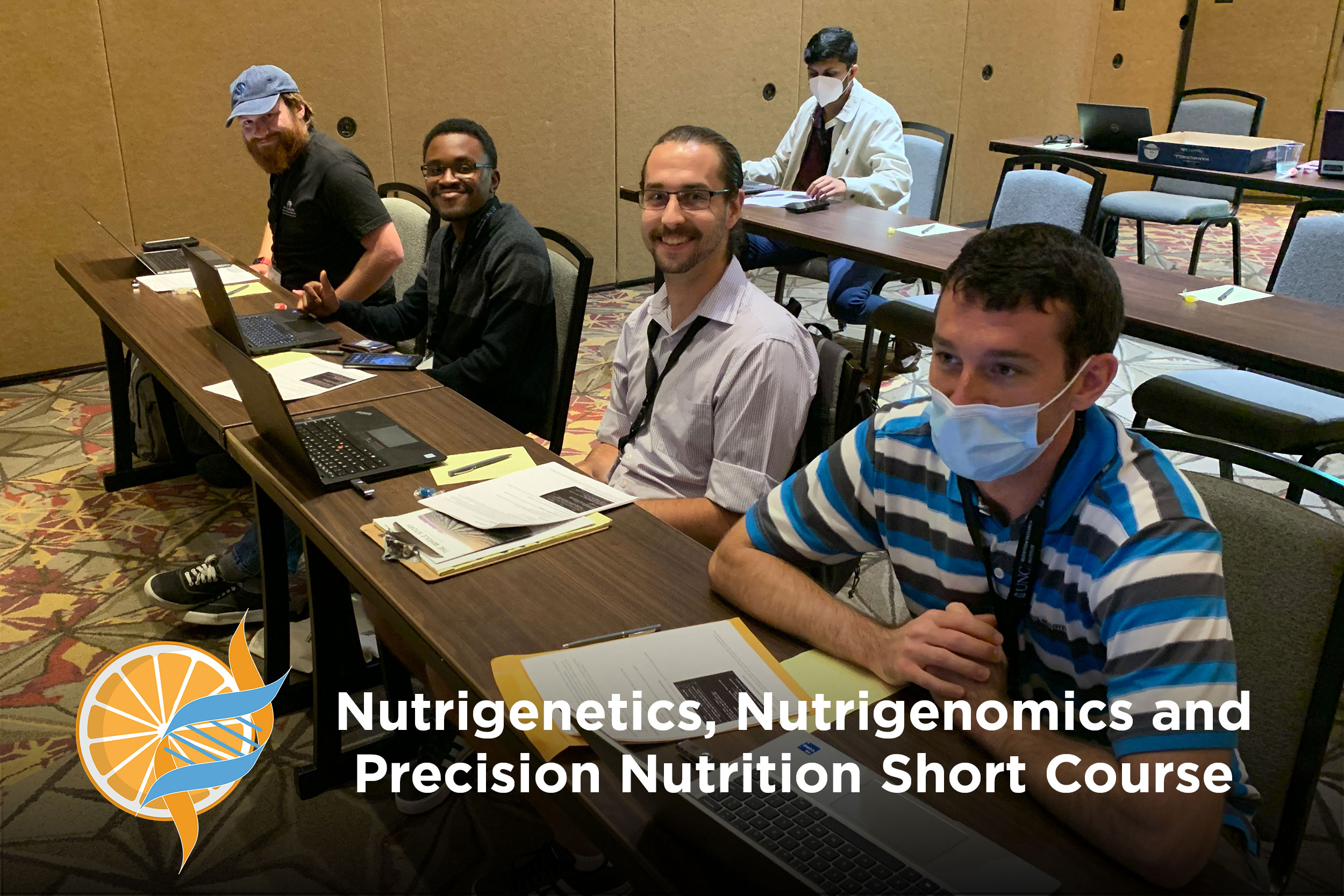Susan J. Sumner, PhD
Professor of Nutrition and Pharmacology
Susan Sumner, PhD is a Professor of Nutrition at UNC Chapel Hill’s Nutrition Research Institute (NRI), and the Director of the Metabolomics and Exposome Laboratory (MEL) at UNC Chapel Hill. Dr. Sumner is working to make personalized medicine and precision nutrition a reality. Using state-of-the-art metabolomics and exposome technologies, Dr. Sumner’s team determines how molecules that are present in our tissues and biological fluids are associated with states of health and wellness. Through this approach, biomarkers are discovered that can lead to new diagnostics for the early detection and diagnosis of disease, to monitor treatment and intervention, and to inform the development of intervention strategies.
The Sumner-Lab uses analytical methods to detect tens of thousands of signals for molecules that are present in biological specimens (such as urine, serum, plasma, feces, sweat, tissues, and cells).Using untargeted metabolomics/exposome analysis, signals are detected for metabolites that are derived from endogenous metabolic process, such as neurotransmitters, hormones and steroids, sugars, amino acids, purines and pyrimidines, lipids, fatty acids, and vitamins and essential nutrients. Signals are also detected for metabolites derived from a wide range of exposures, including metabolites derived from ingestion of foods, intake of medications or drugs of abuse, and environmentally relevant chemicals.
Show More
Emily Brasseur
Research Technician, Sumner Lab
Emily graduated from Catawba College with a Bachelors in Biochemistry and a minor in History in 2023. She is excited to be with the Sumner Lab and looks forward to learning everything that she can. She is a Michigan native that misses the snow but does not miss the cold. In her down time, Emily loves to read, play games, and crochet many different things.

Yuheng Che, MS
Graduate Student, Sumner Lab
Yuheng joined UNC Chapel Hill NRI in January 2025 as a doctoral student in Nutrition. He earned his Bachelor of Science in Clinical Nutrition from the University of California, Davis, and his Master of Science in Biochemical and Molecular Nutrition from Tufts University. At the Nutrition Research Institute, Yuheng works closely with Dr. Susan Sumner and Dr. Blake Rushing, focusing on precision nutrition and metabolomics.

Bryan Chuprinko, MBA
Visiting Scholar, Sumner Lab
Bryan Chuprinko is a Program Manager at Coddle Creek Capital, overseeing life science programs. He has collaborated with UNC-NRI on behalf of Coddle Creek Capital to bring value to the North Carolina Research Campus (NCRC).

Rachel Coble, MS
Assistant Laboratory Manager, Sumner Lab
Rachel Joined the UNC Chapel Hill NRI in August 2020 as a Research Technician in the Sumner Lab. As a local of Rowan County, specifically China Grove, she graduated from Catawba College in 2020 with a B.S. in Biochemistry. She has always wanted to have some kind of involvement at the NCRC ever since she saw the campus being built as a little girl. Since joining Sumner’s lab, Coble returned to school to further her education. Pursuing her Master's degree in Informatics and Analytics with a Bioinformatics concentration has been a transformative journey, significantly enhancing her expertise in handling and interpreting complex data sets. By learning analytical techniques and informatics tools, she is equipped to process vast amounts of metabolomic data with greater accuracy and efficiency. The skills and knowledge gained through her Master's program enable her to contribute more to her metabolomics research, drive impactful data-driven insights, and support the NRI's goals in advancing metabolomics.

Isabella Falcone
Student Research Assistant, Sumner Lab
Isabella joined the Sumner Lab as a student intern in 2023. She is an undergraduate student pursuing a BSPH in the Nutrition program through the UNC Gillings School of Global Public Health, as well as a minor in Chemistry. As Isabella aims to attend medical school following her undergraduate career, she is eager to learn from Dr. Sumner and her team. In Isabella’s free time she enjoys running, baking, and crafting

Susan McRitchie, MA, MS
Program Manager, Sumner Lab
Susan McRitchie, MA/MS has over 10 years of experience conducting biostatistics in the field of metabolomics, and has over 15 years of experience using biostatistics in clinical and epidemiology investigations. She is the lead biostatistician and program manager for the NIH Common Fund Metabolomics and Clinical Assay Center (PI, Susan Sumner) for the Nutrition for Precision Health study, for the NIEHS Human Health Exposure Analysis Resource program (MPI, Sumner/Du/Fennell), and for the Metabolomics and Exposome Laboratory at the UNC Chapel Hill Nutrition Research Institute (Director, Sumner). In these roles, she participates in working groups of the NIH consortium involving data management, data quality, and omics analysis, and leads data analysis. She has trained over 20 students, postdoctoral fellows, early career and senior faculty to conduct statistical and multivariate analysis in metabolomics investigations. Susan McRitchie earned a MA in mathematics from UCLA and a MS in Biostatistics from UNC Chapel Hill.

Sabrina Molina
Assistant Laboratory Manager, Sumner Lab
Sabrina graduated from UNC Charlotte with a degree in biology, working in a bioinformatics lab during her time there. She began as a student intern in the Sumner lab and is now working as the Assistant Laboratory Manager. She is very excited to continue working with all the amazing people at the NRI. In her spare time, Sabrina enjoys cooking, kayaking, fishing, and dirt biking.

Wimal Pathmasiri, PhD
Assistant Professor of Nutrition
Wimal Pathmasiri, PhD is an Assistant Professor at the University of North Carolina at Chapel Hill’s Nutrition Research Institute (NRI). An overarching goal of Dr. Pathmasiri’ s research includes understanding the links between exposures (diet, constituents in natural projects, environmental chemicals, drugs), microbial metabolism, and human health. He was worked with the Sumner-Lab for over 12 years, as the director of a technology core for the NIH Common Fund Eastern Regional Comprehensive Metabolomics Resource Core (ERCMRC), and as a co-investigator in the North Carolina Human Health Exposure Analysis Resource Untargeted Analysis Laboratory (NC HHEAR UAL). Learn more.

Braden Yorke
Student Research Assistant, Sumner Lab
Braden Yorke is an undergraduate student at the University of North Carolina at Chapel Hill, pursuing a degree in Nutrition Science and Research. Braden is an intern in Dr. Sumner’s lab at the UNC Nutrition Research Institute where he hopes to explore the field and learn as much as possible.
BSPH Students

Heidi Cao
BSPH Candidate

Mansi Choudhari
BSPH Candidate
The North Carolina Human Health Exposure Analysis Resource Hub (NC HHEAR Hub)
Metabolomics and Exposome Laboratory (MEL) for the following NIH Centers
Nutritional Pharmacology/Toxicology
Choline and Related Metabolites in Nutrition Research
Metabolomics: Using In Vitro Models to Reveal Mechanisms of Cellular Response
700 MHz NMR Spectroscopy Services on the North Carolina Research Campus
Quantitative Targeted Analysis of Host Metabolism - Biocrates
Recent Grants
R01CA282657 (Rushing, PI, UNC-CH): 2024 – 2029
NIH/NCI
The Human Cancer Metabolome Atlas
1U24CA268153-02S (Sumner, PI, UNC-CH):2023 – 2025
NCI/NIH Common Fund
Nutrition for Precision Health: Targeted Metabolomics, Phytochemicals, and Clinical Assays
1U24CA268153 (Sumner, PI, UNC-CH): 2022 – 2027
NCI/NIH Common Fund
Metabolomics and Clinical Assays Center (MCAC) for the Nutrition for the Precision Health Study
1R01DK126666-01 (Sumner, MPI, UNC-CH):2021 – 2026
NIDDK
Mechanistic and metabolic underpinnings of ALDH1L1 polymorphisms in the regulation of glycine metabolism
1U2CES030857 (Sumner, MPI, UNC-CH):2019 – 2026
NIEHS
Human Health Exposure Analysis Resource (HHEAR) Hub and Environmental Influences on Childhood Outcomes (ECHO)
U01OH011300-05 (Nolan, PI, NYUSOM): 2017 – 06/30/2026
NIOSH
Title: Metabolomics of World Trade Center-Lung Injury
R01HL143885 (Sumner, MPI, UNC-CH): 2019–2023
NHLBI
Leveraging multi-omics approaches to examine metabolic challenges of obesity in relation to cardiovascular diseases.
1U01CA235507 (Du, PI, UNC-Charlotte): 2018–2022
NCI
Cross-Platform and Graphical Software Tool for Adaptive LC/MS and GC/MS Metabolomics Data Preprocessing
1R37CA226969-01 (Bae-Jump, PI, UNC-CH): 2018–2023
NCI
Obesity-driven Metabolic and Molecular Biomarkers of Metformin Response in Endometrial Cancer
1R21CA235029-01 (Smith-Ryan & Bae-Jump, MPI, UNC Chapel Hill): 2019–2020
NCI
Interval Exercise Training as a Therapy for Endometrial Cancer
1U01OH011300-01A1 (Nolan, PI, NYUSOM): 2017– 2023
NIOSH
Metabolomics of World Trade Center-Lung Injury
1R01DK115380-01 (Zeisel, PI, UNC Chapel Hill): 2017- 2021
NIDDK
Developing a Biomarker Panel to Assess Choline Nutritional Status
U01ES027254 (Sumner, MPI, UNC Chapel Hill): 2016–2021
National Institute of Environmental Health Sciences
Early-life END exposure and the impact on neurobehavioral, cardiovascular, and biochemical mechanisms.
5UG3OD023275 (Karagas, PI, Dartmouth College): 2016-2023
National Institute of Environmental Health Sciences
Environmental Influences of Child Health Outcomes (ECHO) Pediatrics Cohort
New Hampshire Birth Cohort
5UG3OD023305 (Trasande, PI, NYU School of Medicine): 2016-2023
National Institute of Environmental Health Sciences
Environmental Influences of Child Health Outcomes (ECHO) Pediatrics Cohort
NYU Pediatric Obesity, Metabolism and Kidney Cohort Center
R01DK110077 (Smoyer, PI, Nationwide Children’s Hospital) 2017-2022
NIDDK
Integrating Proteomics and Metabolomics to Understand Pediatric Glomerular Disease
1R21HD087878-01A1 (Harville, PI, Tulane): 2017-2019
NICHD
Preterm birth, pre-eclampsia, and the exposome
Breast cancer risks and new treatment options
The combination of few treatment options and the aggressive nature of triple-negative breast cancer (TNBC) results in a higher recurrence and mortality rate. Research from the NRI seeks to understand TNBC mechanisms with the goal of directing development of...
Precision nutrition improves health at individual level, expert says
Susan Sumner, PhD, is a professor of Nutrition and pharmacology at the UNC Nutrition Research Institute. Using state-of-the-art metabolomics and exposome technologies, Sumner’s team determines how molecules that are present in our tissues and biological fluids are...
Faculty Focus: Wimal Pathmasiri, PhD
Metabotyping for Better Health For 12 years, Wimal Pathmasiri, PhD, has been conducting metabolomics research to understand the links between exposures, microbial metabolism, and human health. His specific field of study is biomarker identification by metabolic...
NGx: A short course in Nutrigenetics, Nutrigenomics and Precision Nutrition – Day Two
The NRI presented its annual NGx short course May 16-19, in Concord, NC, for graduate students, health professionals, and nutrition scientists. See recap of Day One. On Day Two of the short course, attendees heard from experts on using nutrigenetics, nutrigenomics,...
NRI Trainees Climbing the Ladder of Success
A core objective of the NRI is to provide training opportunities to the next generation of researchers in precision nutrition, including graduate and undergraduate students. These young researchers, selected from the tops of their classes, are mentored by the NRI’s...
Homegrown: Local Graduates Excel at the NRI
Madison Schroder Mooresville, NC B.S. Chemistry, UNC-Chapel Hill Rachel Coble China Grove, NC B.S. Biochemistry, Catawba College For many members of this community, the North Carolina Research Campus (NCRC) is a relatively new sight in Kannapolis. Before the NCRC...
North Carolina Research Campus team receives major NIH award for precision nutrition research
KANNAPOLIS, N.C., January 27, 2022 – The National Institutes of Health (NIH) has awarded a $19.2 million 5-year grant, pending the availability of funds, to a consortium of North Carolina university researchers who will apply cutting-edge analytical techniques to...
UNC nutrition experts uncover structure of enzyme that could aid in disease treatment, prevention
This article was published originally by the Gillings School of Global Public Health on January 25, 2022. New findings from researchers at the UNC Nutrition Research Institute (NRI) have revealed the structure of an enzyme that plays a key role in predicting whether a...
2025
2024
Changes in senescence markers after a weight loss intervention in older adults with obesity
Untargeted metabolomics reveal signatures of a healthy lifestyle
Transforming Big Data into AI-ready data for nutrition and obesity research
Patterns of infant fecal metabolite concentrations and social behavioral development in toddlers
Prospective association of the infant gut microbiome with social behaviors in the ECHO consortium
2023
2022
2022
Commonalities in Metabolic Reprogramming between Tobacco Use and Oral Cancer
Alterations in Microbial-Associated Fecal Metabolites in Relation to Arsenic Exposure Among Infants
Multimodal Diagnostic Approaches to Advance Precision Medicine in Sarcopenia and Frailty
Sex-Specific Metabolic Effects of Dietary Folate Withdrawal in Wild-Type and Aldh1l1 Knockout Mice
Dietary Supplements for Athletic Performance in Women: Beta-Alanine, Caffeine, and Nitrate
Multi-Omics Analysis of Multiple Glucose-Sensing Receptor Systems in Yeast.
2021
2021
Emerging technologies and their impact on regulatory science
Bridging the Gap Between Analytical and Microbial Sciences in Microbiome Research
Associations between the gut microbiome and metabolome in early life
Multi-omics analysis of glucose-mediated signaling by a moonlighting Gβ protein Asc1/RACK1
Metabolic Response of Triple-Negative Breast Cancer to Folate Restriction
Metabolomics reveals biomarkers of opioid use disorder
Existing antiviral options against SARS-CoV-2 replication in COVID-19 patients
2020
2019
Predicting and Defining Steroid Resistance in Pediatric Nephrotic Syndrome Using Plasma Proteomics.
Cytosolic 10-formyltetrahydrofolate dehydrogenase regulates glycine metabolism in mouse liver.
Deleterious mutations in ALDH1L2 suggest a novel cause for neuro-ichthyotic syndrome.
Health-related quality of life in glomerular disease.
Human PAH is characterized by a pattern of lipid-related insulin resistance.
Metabolomics for Biomarker Discovery and to Derive Genetics Links to Disease.
2018
Antibiotic-induced acceleration of type 1 diabetes alters maturation of innate intestinal immunity.
Correlated metabolomic, genomic, and histologic phenotypes in histologically normal breast tissue.
Using Metabolomics to Investigate Biomarkers of Drug Addiction.
Human microbiota, blood group antigens, and disease.
Effect of endotoxin and alum adjuvant vaccine on peanut allergy.
2017
2016
Antibiotic-mediated gut microbiome perturbation accelerates development of type 1 diabetes in mice.
Metabolomics enables precision medicine: “A White Paper, Community Perspective”.
Impact of a western diet on the ovarian and serum metabolome.
Blood type biochemistry and human disease.
The Importance of the Biological Impact of Exposure to the Concept of the Exposome.









